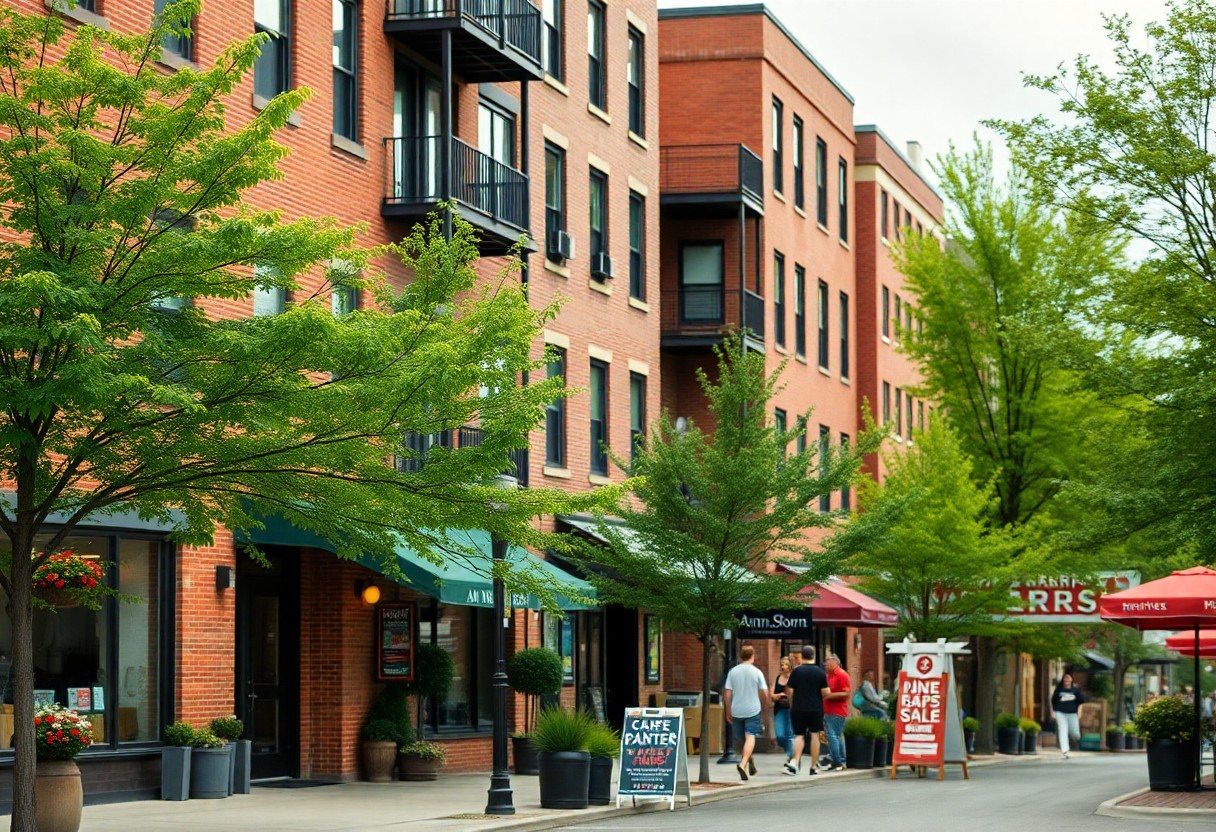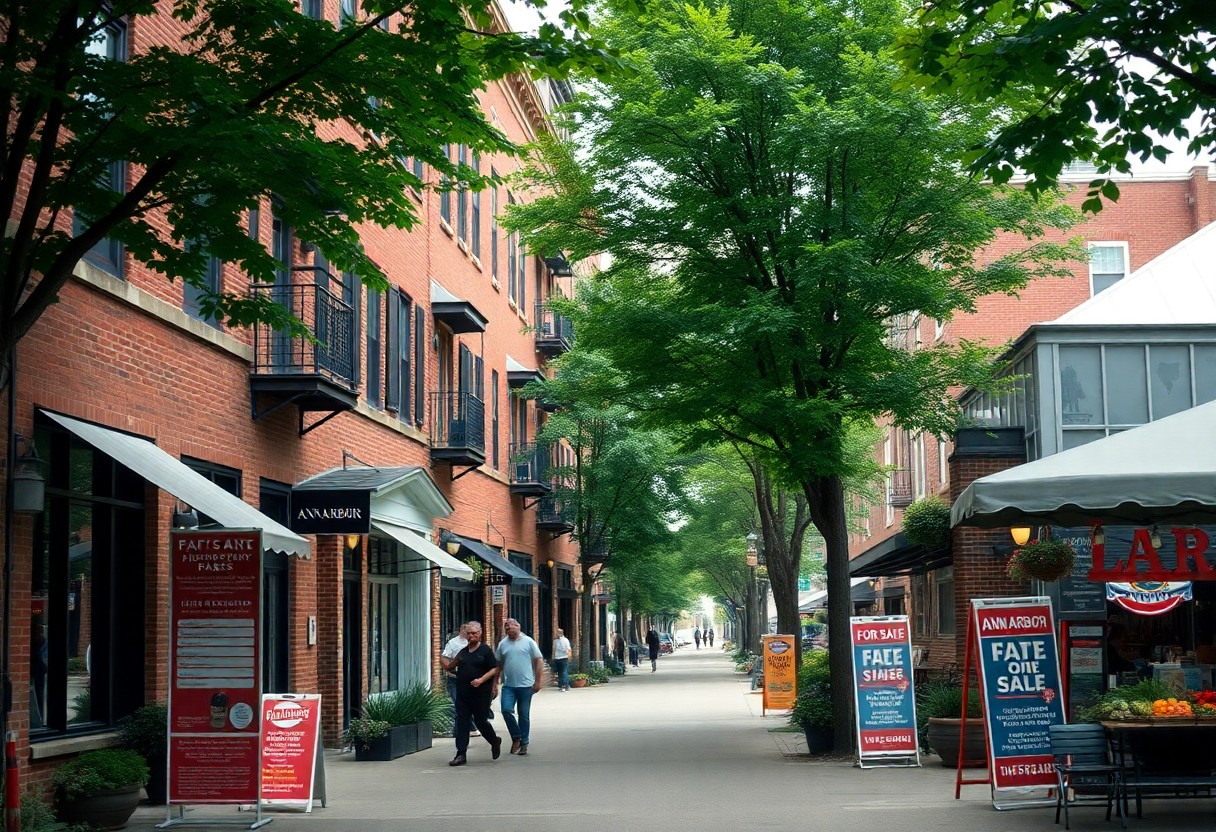There’s no denying that Ann Arbor stands out as a premier location for real estate investment in 2023. With its robust economy, vibrant culture, and a steady influx of students and professionals, the city offers a unique blend of opportunities for savvy investors like you. Whether you’re a seasoned investor or just starting out, understanding the dynamics of this market can help you make informed decisions that can lead to substantial financial growth. Dive in as we explore the reasons why Ann Arbor should be on your investment radar this year.
Key Takeaways:
- Ann Arbor boasts a strong economy, driven by its educational institutions and technology sector, creating a stable job market and attracting a steady stream of renters.
- The city’s vibrant cultural scene and amenities appeal to a diverse population, including students and professionals, ensuring high demand for residential properties.
- Investment opportunities are abundant, with a variety of property types available, from single-family homes to multi-family units, allowing investors to diversify their portfolios.

Understanding the Types of Real Estate Investments
While considering real estate investments in Ann Arbor, it’s crucial to understand the various types available. Each type of investment carries its benefits and risks, and comprehending these will aid in selecting the right strategy for your financial goals. The main investment categories you may explore include:
| Type of Real Estate Investment | Description |
|---|---|
| Residential Properties | Investment in homes or apartments intended for people to live in. |
| Commercial Properties | Investing in properties used for business purposes. |
| Multi-Family Units | Properties that accommodate multiple separate households within a single building. |
| Land | Purchasing vacant land for future development or resale. |
| Real Estate Investment Trusts (REITs) | Investing in companies that manage, own, or finance income-producing real estate. |
The key to a successful real estate portfolio lies in diversifying across these investment types to balance risk and reward effectively.
Residential Properties
Assuming you are leaning towards residential properties, you will typically be involved in buying single-family homes, condos, or townhouses. This type of investment is often favored by first-time investors due to its relatively straightforward management and potential for steady rental returns. Ann Arbor, with its thriving community and universities, offers fantastic opportunities in this sector. Additionally, you will find that the demand for quality residential accommodations is consistently high, contributing to long-term capital appreciation.
Since residential properties can provide consistent cash flow through rents, understanding the local rental market is beneficial. You may want to explore aspects such as rental rates, vacancy rates, and neighborhood desirability to make informed decisions. The market in Ann Arbor particularly favors residential investments due to its stable economy and high tenant demand.
Commercial Properties
Clearly, investing in commercial properties can provide greater returns compared to residential options. This category includes office buildings, retail spaces, and industrial warehouses, among others. These investments typically involve longer lease terms, which can lead to more stable cash flow. Ann Arbor’s growing economy and business environment make it an appealing place for commercial real estate investments. Engaging in market research will help you assess potential locations and types of commercial spaces that align with current demand trends.
With the right strategy, commercial properties can potentially yield higher rental income and appreciation. Leasing is often tied to business performance, meaning that selecting tenants is a vital consideration. A thorough understanding of market dynamics and prevailing economic conditions will equip you for success in this area.
Residential properties come with specific regulations and market characteristics that require due diligence to navigate effectively. You should familiarize yourself with local real estate laws, tenant rights, and market trends to maximize your investment returns.
Multi-Family Units
You will find that multi-family units can be an excellent investment to consider within the Ann Arbor market. These properties are often more efficient than single-family homes, offering the potential for higher occupancy rates and income from multiple tenants living in one building. By investing in multi-family units, you benefit from economies of scale that can improve cash flow and reduce overall maintenance costs. They are particularly appealing in areas with steady population growth, making them a strong choice for investor attention.
The versatility of multi-family units allows you to take advantage of varying market demands while also appealing to a wider demographic of renters. As you create your investment strategy, considering the location and the type of multi-family unit can significantly influence your return on investment.
1. Thriving economy attracts diverse job opportunities and residents.
2. Growing population enhances demand for housing options.
3. Strong rental market supports steady cash flow potential.
4. Excellent educational institutions drive residents and investment interest.
5. Low crime rates create appealing neighborhoods for families.
6. Vibrant cultural scene boosts lifestyle appeal and property values.
Key Factors Influencing Investment Potential
Assuming you are looking to make a sound investment in real estate, understanding the key factors that influence investment potential is vital. Ann Arbor stands out due to a combination of economic stability, lively population trends, and a robust rental market. Here are some of the elements you should consider:
- Thriving local economy
- Diverse job opportunities
- Strong educational institutions
- Growing population and demand for housing
- Positive rental yield and occupancy rates
This foundational knowledge positions you to make educated decisions as a real estate investor.
Economic Growth
Now, let’s research into the economic growth of Ann Arbor, which serves as a robust pillar for its real estate market. The city boasts a diverse economy characterized by a concentration of jobs in technology, healthcare, and education. With reputable institutions like the University of Michigan leading the charge, you can expect continued investment in infrastructure and business development. This generates a stable job market that is likely to attract new residents and investors alike. Additionally, according to Top Real Estate Markets in Michigan for 2025 – ase/anup, the economic indicators for Ann Arbor are trending positively.
Population Trends
With the increasing interest in urban living, Ann Arbor is witnessing significant population growth that contributes directly to its real estate potential. The city remains a favored location for students, young professionals, and families, providing a steady influx of residents seeking homes. This growing population not only supports local retailers and services but also fosters demand for housing, encouraging investment opportunities in both single-family homes and multi-family units.
Influencing this trend are factors such as quality of life, vibrant culture, and a strong job market that continues to draw individuals and families to the area. As a prospective investor, staying attuned to these shifts will enable you to align your investment strategy with the ever-changing dynamics of Ann Arbor’s population.
Rental Market Analysis
On the front of rental market analysis, Ann Arbor presents compelling opportunities for real estate investors. The demand for rental properties remains high due to a mix of students attending the University of Michigan and professionals relocating to the area for work. As inventory continues to dwindle, rental prices are increasing, making it an attractive proposition for those looking to generate passive income. Additionally, a well-managed property can achieve high occupancy rates, further enhancing your earning potential.
Potential investors should consider the varying rental strategies that can be employed in Ann Arbor, from long-term leases designed for families to short-term rentals catering to the abundant student population. Understanding market dynamics will allow you to maximize your investment yields while navigating the competitive landscape of renting in the area.
Tips for Investing in Ann Arbor Real Estate
For a successful real estate investment journey in Ann Arbor, it’s important to arm yourself with the right strategies. Start by assessing your goals and determine what type of property suits your investment style, be it single-family homes, multi-family units, or commercial spaces. Here are some tips to consider:
- Investigate the neighborhood’s growth potential.
- Work with reputable local realtors who understand the market.
- Analyze property values and rental rates.
- Stay updated with city developments and zoning laws.
Any strategy you adopt requires you to be informed and proactive. Additionally, check out Unveiling Michigan’s Hidden Gems: Top Places to Invest for insights on other lucrative areas in the state.
Research the Local Market
Real estate investment fundamentally relies on your awareness of the surrounding market conditions in Ann Arbor. Conducting thorough market research allows you to understand the trends, average home prices, and demand for rental properties. Pay close attention to historical data, as well as current listings that provide critical insights regarding price fluctuations and neighborhood dynamics.
Moreover, consider attending local real estate investment meetings or forums, where you can gather valuable information from both experienced investors and newcomers. Gathering testimonials and case studies can also equip you with deeper insights into the types of investment opportunities that are thriving in the area.
Network with Real Estate Professionals
Real estate is as much about connections as it is about properties. Networking with seasoned professionals in Ann Arbor can significantly improve your odds of success in the market. Establishing strong relationships with realtors, property managers, and investment groups will not only widen your access to exclusive opportunities but also keep you informed of any potential pitfalls to avoid.
Tips for networking include attending local industry events, joining online forums and social media groups, and engaging in conversations with people who share your passion for real estate. Building a reliable network is invaluable, as these connections may even lead you to mentorship and guidance as you navigate the complexities of investing.
Leverage Financing Options
For many investors, knowing how to leverage financing options is a key part of successful real estate investing in Ann Arbor. Research various financing routes including traditional mortgages, private lenders, and even creative financing solutions like seller financing. Understanding each option will allow you to choose the one that aligns best with your financial strategy and investment goals.
Financing plays a pivotal role in determining your purchasing power. By comparing interest rates, terms, and loan types, you can identify the most beneficial financial arrangement for your property investments. Additionally, don’t hesitate to seek pre-approval, as this can instill confidence in sellers and streamline the purchasing process.
Step-by-Step Guide to Purchasing Property
Despite the complexities involved in purchasing property, breaking down the process into manageable steps will empower you to make informed decisions. This guide will help you navigate the intricacies of real estate investing in Ann Arbor and ensure you are well-prepared for each phase of the journey.
| Step | Description |
|---|---|
| Set Your Investment Goals | Define your long-term objectives and desired outcomes in your investment. |
| Find the Right Property | Research potential properties based on your investment criteria and budget. |
| Navigating the Closing Process | Understand the steps required to finalize the purchase and transfer ownership. |
Setting Your Investment Goals
On your journey to purchasing property, it is vital to set clear investment goals that align with your vision for your real estate portfolio. Consider factors such as your budget, time frame for returns, and whether you want to invest for cash flow or appreciation. Having these goals defined will guide your property search and help you evaluate potential investments more effectively.
On top of that, you should also assess your risk tolerance and how much hands-on management you are willing to undertake. This includes deciding if you prefer to invest in residential, commercial, or multi-family properties. Establishing these parameters will not only streamline your search but also enhance your overall investment strategy.
Finding the Right Property
Assuming you have set your investment goals, the next step is to find the right property that aligns with those objectives. Begin by researching the local market trends in Ann Arbor, focusing on neighborhoods with high rental demand and property appreciation potential. You can leverage online resources, real estate agents, and local property listings to identify suitable options.
Assuming you have identified a handful of properties, you should analyze their financials, including costs, projected cash flows, and potential resale value. Visiting properties in person can also give you insight into their condition and neighborhood dynamics, further informing your purchasing decision.
To ensure you fully understand a property’s potential, you may want to consider bringing in a real estate agent with local expertise or a property inspector. They can help you evaluate the property’s condition and offer guidance on pricing, which is especially valuable in a competitive market like Ann Arbor. Understanding the ins and outs of each property will give you the confidence needed to move forward with a purchase.
Navigating the Closing Process
With a property identified and your offer accepted, it’s time to navigate the closing process. This phase involves paperwork, inspections, and potentially negotiations regarding necessary repairs or contingencies. Make sure you have all the required documents in order, including your loan approval, inspection reports, and any agreements with the seller.
With proper preparation, the closing process can be streamlined. Engage with your attorney and any involved real estate professionals to ensure all aspects of the transaction are handled appropriately and on time. Being proactive about deadlines and requirements during this stage can prevent issues that could arise later.
For instance, communication with your lender is key, as any delays in their processes can push back your closing date. Keeping an open line of dialogue between you, your agent, and your lender will help facilitate a smooth transaction and promote transparency in the process.

Pros and Cons of Investing in Ann Arbor
Your decision to invest in real estate in Ann Arbor can be reinforced by weighing the pros and cons of this vibrant market. The city offers a unique backdrop for investment opportunities but also comes with its set of challenges. Here’s a quick comparison:
| Pros | Cons |
|---|---|
| Strong rental demand due to the University of Michigan. | High property prices may limit entry for some investors. |
| Diverse economy with various employment sectors. | Potential for market fluctuations in a college town. |
| Attractive quality of life and amenities. | Regulatory challenges can complicate property management. |
| Long-term appreciation potential. | Seasonal rental variations can affect income. |
| Growing population leading to increased housing demand. | Competition can be fierce among investors. |
Advantages of Real Estate in Ann Arbor
Clearly, investing in real estate in Ann Arbor presents you with numerous advantages. The presence of the University of Michigan attracts a steady influx of students and faculty, ensuring a robust rental market. Additionally, the city boasts a well-rounded economy that supports various job sectors, which can help stabilize property values and rental rates over time. The quality of life in Ann Arbor, highlighted by excellent schools, parks, and cultural offerings, further adds to its appeal for families and professionals alike.
These factors contribute to a favorable real estate investment environment. As a potential investor, you can take comfort in the long-term appreciation potential of properties within the area. Furthermore, an increasing population creates consistent demand for housing, making it an opportune time to leverage the growing market dynamics in your favor.
Potential Challenges and Risks
An important aspect of investing in any market is understanding the potential challenges and risks involved. While Ann Arbor remains a desirable location, high property prices could pose a barrier to entry for many investors. Additionally, being a college town, the rental market can display seasonal variations; occupancy rates may dip during holidays or summer breaks, impacting your cash flow. Furthermore, local regulations can be complicated, especially for those new to property management, potentially causing delays or increasing overhead costs.
Risks associated with investing in Ann Arbor’s real estate market may include fluctuations in the local economy and competition from other investors. As demand grows, more individuals may enter the market, increasing competition and driving prices higher. It’s vital to remain vigilant and conduct thorough research before committing to any property, ensuring that your investment aligns with your financial objectives and risk tolerance.
Market Trends to Watch in 2023
To navigate the real estate landscape of Ann Arbor in 2023, it is crucial to stay informed about key market trends that will shape your investment strategies. One of the most noteworthy trends is the ongoing development of emerging neighborhoods. With the city’s expansion, areas that were once overlooked are gaining traction and attracting buyers and renters alike. This gentrification process presents a prime opportunity for you to discover hidden gems before they become hotspots, allowing you to capitalize on appreciation and rental demand as these neighborhoods grow in popularity.
Emerging Neighborhoods
Any real estate investor worth their salt knows the importance of identifying neighborhoods on the rise. In Ann Arbor, you might want to keep your eyes on areas such as North Main Street and West Side, which are experiencing revitalization through new commercial projects and residential developments. These emerging neighborhoods not only offer more affordable entry points compared to established areas, but they also provide the potential for significant returns as the demand for housing increases due to their prime locations and growing amenities.
Changing Rental Demand
Market trends indicate a shift in rental demand in Ann Arbor, which is significant for your investment decisions. As remote work continues to redefine where people choose to live, you may notice that renters are increasingly seeking accommodations that offer more space, in both urban and suburban settings. This growing emphasis on lifestyle factors, such as proximity to parks, outdoor spaces, and access to local hotspots, suggests that you may want to consider properties that cater to these preferences.
A considerable portion of the rental market in Ann Arbor is leaning towards multi-family units and single-family homes in desirable locations. Your focus should not only be on the property itself but also on the surrounding community amenities that can enhance rental appeal. Properties located near public transport, schools, and vibrant commercial areas are proving to be more attractive to tenants. Staying abreast of these changing dynamics will help you make informed investments that align with tenants’ evolving needs in 2023.
To Wrap Up
With these considerations, it becomes clear that Ann Arbor is a standout city for real estate investment in 2023. The combination of a vibrant economy, a strong rental market, and the presence of respected educational institutions creates an environment that supports sustained growth. You can leverage the steady influx of young professionals and families seeking quality housing options, making it a prime opportunity for both residential and commercial property investments.
Moreover, the supportive local government and community initiatives are designed to enhance the livability and attractiveness of the city, further solidifying your investment’s potential returns. As you navigate the real estate landscape, consider Ann Arbor’s unique characteristics and advantages, which position it favorably in the current market. By investing here, you are not just acquiring property; you are securing a stake in a thriving community with an optimistic future.
Q: What makes Ann Arbor’s real estate market appealing to investors in 2023?
A: Ann Arbor stands out in 2023 due to its strong economic fundamentals, including a diverse job market fueled by major employers like the University of Michigan and research institutions. The city also has a consistent demand for housing, driven by a growing population and students seeking off-campus living options. This combination of stable demand, job growth, and a vibrant culture makes it an attractive location for real estate investment.
Q: How does Ann Arbor’s rental market compare to other cities?
A: Ann Arbor’s rental market is particularly robust, with a low vacancy rate and a rental market that often sees higher-than-average rental prices. The presence of a large student population and a steady influx of professionals contributes to this demand. Investors can benefit from a reliable income stream through rental properties, especially in areas close to the university and major employers. Compared to other cities, Ann Arbor offers competitive returns on investment in the rental sector.
Q: What are the long-term prospects for real estate investment in Ann Arbor?
A: The long-term prospects for real estate in Ann Arbor are promising due to ongoing developments in infrastructure and community amenities. The city is continually investing in urban renewal projects, enhancing public spaces, and improving transportation options. Additionally, the growth of the tech and healthcare sectors within the area is expected to attract more residents and businesses. These factors suggest a solid future for property values, making it a strategic choice for investors looking for sustainable growth.



